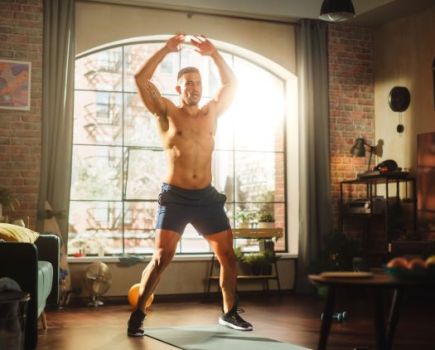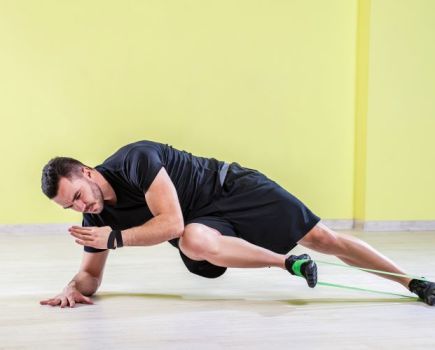The no-nonsense equipment at Brixton Street Gym might lack the bells and whistles of your high-street leisure centre, but founder Terroll Lewis knows better than most that you don’t need much to get in shape.
Between 2008 and 2009, Lewis served time in Belmarsh Prison, for involvement in a gun murder for which he was eventually cleared. While he was locked up, his ‘gym’ consisted of a bed, a bin and a toilet seat.
“I first started doing calisthenics as something to do,” he says. “That was my meditation – my time away from time.”
Before then, there was no time for exercise – only robbery and drug dealing as ‘Boost’, a high-ranking member of Brixton’s notorious OC street gang.
When he was a young boy – looking up at the cash-flaunting older lads who loitered around the Myatts Field estate where he lived with his grandparents – OC stood for ‘Organised Crime’. Later, it turned into ‘One Chance’, represented by the tattoo on Lewis’ neck: ‘one chance 2 live’.
Troubled beginnings
Now 31, his life was violent even before he was born. When his mother was 21 and seven months pregnant with him, a man punched her in the face and threw her over a balcony.
When Lewis was seven, she was already sending him out to buy cannabis for her, while smoking crack cocaine. She has recovered since, but he mostly grew up with her Irish parents. He rarely saw his father.
“I had a wild upbringing and was exposed to a lot of stuff,” he says. “This is before the gangs: this was domestic violence in the household. I didn’t have any father figure to guide me in the right way, so what I saw around me was what I became attracted to: the streets, the crime, the violence, the noise. I thought they were a good thing at the time.”
Lewis has told his story in a powerful book published at the start of 2021, called One Chance: Surviving London’s Gangs. As he talks about his childhood and especially his teens, the shocking details pile up. But it’s also easy to see why. Because these things have happened so gradually and from such a young age, he experienced complete immersion.
“The book is obviously not glamorising gang life,” says Lewis. “It’s just telling the story of a boy who’s gone through some real life stuff and real life situations. I want people to understand why kids get involved in these gangs, which is essentially to find the community and family that’s missing from their lives.
“There is a lot of trauma behind a lot of these young people’s mindsets, which push them down a certain road, and if there are no positive influences, a lack of father figures, a lack of a certain type of energy, it’s one-way traffic.”
War path
He refers several times to the idea of ‘real-life Call of Duty’, and there is a clear sense of young boys playing war. In Myatts Field, which he and his friends called Baghdad, he writes that ‘The air smelled of gunpowder.’
On his first day of secondary school in Stockwell, he was carrying a screwdriver and a knife stolen from his nan and grandad’s kitchen drawer. At the same age, 11, he was stabbed for the first time.
Anyone looking at a larger map might think that OC and the Peckham Boys gang were from the same place, south London, but in fact they were deadly rivals, guarding their estates against enemy incursions day and night.
He says he was 14 or 15 when he bought his first gun, which he likens to buying a second-hand car: you have to know the right questions to ask.
His journey into ever more serious gang life seems to have been a fairly steady descent, though there was a period when he was signed as an apprentice footballer with Stevenage FC and moved to digs in Hitchin, 40 miles north of Brixton. But watching his friends get rich while he was living on beans proved too difficult, and he was soon back in the old life.
The mentality of constant danger led to some scenarios that might sound incomprehensible to anyone outside of this world. When he got a job in a clothes shop on Oxford Street, he would hide his knife under a bush on his way to work and pick it up again on the way home.
He confesses to hunting someone for days with the intention of shooting him because the other boy touched his chain. When the influence of a local pastor, Mimi Asher, grew and he started attending church regularly, he was initially still carrying a gun in the pews.
Today Lewis advocates trying to understand that way of thinking, rather than lecturing.
“We need more conversations with the young people,” he says. “It’s OK to say, ‘Put down the knife; put down the gun.’ But take the knife or the gun away and that person feels naked. Instead we need to ask, ‘Why are you carrying the knife? Why are you carrying the gun?’”
Bodyweight boost
Isolated in Belmarsh, Lewis turned his thoughts inwards and, specifically, to calisthenics.
“Every time I was watching a TV show, I would make sure I knocked out 100 press-ups in the ad breaks – little challenges like that,” he says. “I just got creative with whatever I had at the time: chucking some bottles of water in my washbag for a bit of weight, doing dips on my bed, anything just to keep moving.”
When Lewis was released from prison, he tried to join a branch of Fitness First but was told he would need to set up a direct debit – an alien concept for someone used to stashing his money under his bed – so it was off to the kids’ playground: “I was doing pull-ups on the broken swing, dips on the slide and loads of different things to keep my mind occupied.”
People began to recognise the man they saw exercising in public, and before long more and more wanted to join in.
“When I was training at the playground, people began to train with me and it became a word of mouth thing,” he says. “They would invite others down and gradually it grew and grew. I would post about it on Facebook, then we started inviting people down to Brockwell Park. It started as 20 people and before long it was up to 100.”
He called it Block Workout, and it has gone on to become a feature in other London parks and cities, attracting all kinds of people but particularly those, like Lewis, who might find a conventional gym financially restrictive.
“It brought people from all walks of life together, all different estates together, and there was no trouble at all,” he says. “It felt like a gang again, but a positive gang – everyone was there to better themselves. Just to have that hour or so on a Saturday morning to let off some steam, get active with likeminded people, was amazing. We made so much noise – so much noise.”
View this post on Instagram
Listen up
The local council couldn’t help hearing: “They wanted to know how we were managing to get so many people down to one place. They actually thought it was some kind of fight club! But we explained it was to work out, and eventually they said they wanted to create a dedicated space for us.”
With that, Brixton Street Gym, a fitness hub for the community, was born. It’s a hybrid of the outdoor, improvised workouts that Lewis started out doing, and more organised classes including boxing, spin, dance and sessions for children.
“I can’t explain the love and passion that’s in this place,” he says. “When opening the new site in 2019, the then Mayor of Lambeth Ibrahim Dogus remarked on what was possible “When our young people are offered the chance of a real alternative and an environment where hard work and commitment are properly nurtured and rewarded.’”
It’s a lesson that Lewis has learned himself – the hard way. But he’s in a great place today.
“My life’s been a big, big rollercoaster, but it’s a beautiful struggle,” he says. “It’s all part of my journey. Going through all types of weathers, then coming out the other side and being able to tell the story, and lead by example, is what motivates me now.”
DO THIS: Terroll Lewis’ simple but deceptively difficult descending pyramid workout
- 10 pull-ups
- 10 press-ups
- 9 pull-ups
- 9 press-ups
- Work your way down to 1 of each
- (Then, if you feel brave enough, work your way back up)
View this post on Instagram
Words: David Smyth









